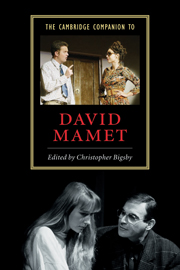Book contents
11 - David Mamet’s fiction
Published online by Cambridge University Press: 28 May 2006
Summary
Speaking in 1977, David Mamet remarked that, “I can't write novels . . . it's just not the form that touches a person . . . The play succeeds by exquisiteness, the novel by brute force, by repetition, by elaboration. It makes a different kind of impression.” By 1994, he had plainly changed his mind, though not entirely. When he turned to the novel he did deploy repetition and elaboration though scarcely brute force. He discovered - what surely he already knew from his voracious reading, particularly of nineteenth-century British and American fiction - that it, too, could succeed by exquisiteness, if we mean by that form and function in alignment, precise moral and linguistic discriminations.
Why reverse himself in the course of those seventeen years? It was, he explained, because “I always wanted to be a writer, and to me a writer was somebody who wrote novels. That’s what a writer was . . . so I figured well . . . if you want to be one, why don’t you try it.”
At the same time, to turn to David Mamet’s fiction is seemingly to enter a different world from his drama. The style, the approach to character and narrative, the pace of the text appear radically at odds with expectations forged by American Buffalo, Glengarry Glen Ross, and Speed-the-Plow, though there are points of contact in an occasionally fragmented dialogue, a sense of the intransitive nature of relationships.
- Type
- Chapter
- Information
- The Cambridge Companion to David Mamet , pp. 194 - 219Publisher: Cambridge University PressPrint publication year: 2004

